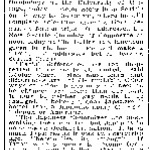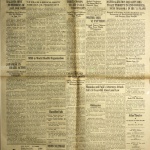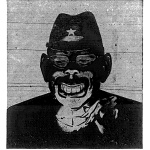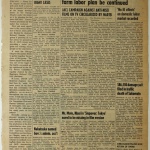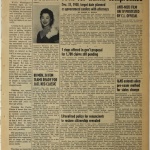John Rankin
| Name | John Elliott Rankin |
|---|---|
| Born | March 29 1882 |
| Died | November 26 1960 |
| Birth Location | Itawamba County, MS |
Lawyer and United States Congressman from Mississippi. During his thirty-two years in the House of Representatives, John Rankin (1882-1960) established himself as an outspoken leader for Southern Democrats. He justly earned a reputation for being a white supremacist while opposing legislation to improve civil rights and by berating racial and religious minorities. Following Pearl Harbor, Rankin advocated confining all ethnic Japanese living in the United States and continued to perpetuate racist Japanese-American stereotypes for the remainder of his tenure.
Before the War
John Elliott Rankin was born March 29, 1882, in Itawamba County, Mississippi, to Thomas Braxton Rankin, a schoolteacher, and Venola Modest Rutledge. He received his primary education in Mississippi's regular school system and went on to earn an LL.B. from the University of Mississippi in 1910. That same year Rankin began practicing law, and in 1912, he advanced to a position as Lee County's prosecuting attorney before enlisting during World War I.
Serving to the war's end—for a total of twenty-one days—Rankin returned to Lee County where he married Annie Laurie Burrous and began editing and publishing the New Era , a weekly newspaper.
In 1920, Rankin successfully campaigned for Congress after having lost the Democratic nomination in 1916 and again in 1918. Rankin went on to represent Mississippi's First District for fifteen consecutive terms, becoming the voice of Southern conservatives and a key spokesman for Southern Democrats. [1] Though Rankin satisfied this role by defending the "common man," states' rights, and white society, he was described by some of his contemporaries as the "No. 1 bigot, hatemonger, and native-born fascist in America." [2]
Despite his reputation as a demagogue, Rankin made several noteworthy contributions during his tenure. His most impressive achievements—facilitating rural electrification through a co-sponsored bill that created the Tennessee Valley Authority (TVA), and ensuring affordable power rates through the Rural Electrification Administration (REA)—ironically, earned him a place among more liberal-minded legislators during his early career. As the chairman for the House Veterans Committee, Rankin was also influential in drafting the G.I. Bill of Rights and helping to restore benefits to disabled veterans. He introduced an additional bill that successfully raised the base pay for servicemen.
For all the improvements Rankin pioneered, however, the Mississippi Congressman obstructed social progress. He ardently defended white supremacy and effectively hindered the advancement of African Americans by fighting civil rights legislation. Rankin, for instance, defended segregation, arguing that it was the only viable means for peaceful cohabitation; he fought against eliminating poll taxes in favor of disenfranchising his African American constituents and believed fair employment practices "persecuted" whites; he further challenged anti-lynching bills, claiming that it would encourage rape. To Rankin, racial equality was inextricably intertwined with national subversion and even sexual perversion. Civil rights was "Communist-inspired," Rankin declared, and would destroy freedom in the United States, the American way of life, and "the white man's civilization throughout the world." [3]
Wartime Stance Against Japanese Americans
Congressman Rankin's prejudices were not confined solely to African Americans; indeed, Rankin was consistently intolerant of other minorities and ideologies, including eastern Europeans, Japanese, Jews, Communists, and Organized Labor. Rankin initially exposed his sentiments toward Asians during his first term in Congress when he introduced a bill to prohibit whites from intermarrying with African Americans or "Mongolians." A decade later, Rankin opposed Hawaii's candidacy to statehood on the basis that it would admit "two Jap senators" to Congress. [4]
After Pearl Harbor, Rankin defended the West Coast's appeal to remove and confine ethnic Japanese in their region. Rankin, along with Congressman Martin Dies of Texas and Senator Tom Stewart of Tennessee, was part of a small, but vocal, contingent from the South that supported West Coast extremists, who believed that the South and the West had a common "race problem." [5] Rankin portrayed all Japanese Americans as subversive and wholly capable of undermining the nation's security. Like others of his time, Rankin assumed ethnic Japanese, regardless of their circumstances, were innately and fanatically loyal to Japan. "Once a Jap always a Jap," he reasoned; "You cannot change him. You cannot make a silk purse out of a sow's ear." [6]
Unlike some of his contemporaries, though, Rankin took a more zealous—if not also polemical—stance, declaring, "I'm for catching every Japanese in America, Alaska, and Hawaii now and putting them in concentration camps...Damn them!" [7] He recommended removing third- and fourth- generation Nikkei and proposed that all ethnic Japanese within the United States be deported at the end of the war. Rankin's anti-Japanese fervor climaxed in late 1942 when he re-introduced Senate Bill 2293. This so-called "concentration camp" bill would have allowed for the removal of any ethnic Japanese in the United States and its territories.
Throughout the war, Rankin addressed new developments that violated his principles with vigor. When, for instance, fictitious rumors began circulating that incarcerated Japanese were receiving unlimited supplies of war-rationed goods, Rankin denounced "coddling the Japs" to his fellow congressmen. [8] He also advocated labeling African-American and Japanese-American blood donations to the Red Cross, lest it contaminate white recipients. [9] And when Congress formed the Japanese-American 442d Combat Unit , Rankin proposed that the young volunteers be placed in labor battalions instead. Even so, many 442d volunteers trained at Camp Shelby near Hattiesburg, Mississippi, despite Rankin's objections that the soldiers were "a serious menace to [the] Gulf Coast defense." [10]
After the War
After 1945, Rankin served seven additional years in Congress, five as a member of the House Un-American Activities Committee (HUAC), which he helped create. Rankin harnessed HUAC as a platform for his anti-Semitism, claiming that immigrant Jews were Communist conspirators. In much the same way that he perpetuated racist attitudes about Japanese barbarism and disloyalty and attacked Nisei claims to American citizenship, Rankin's service with HUAC gave him "a perfect sounding board for spreading suspicion and disunity" about many of America's immigrants and racial and religious minorities. [11]
In 1953, Rankin, having been defeated by Thomas Abernethy, returned to Tupelo, Mississippi where he resumed legal practice. On November 26, 1960, the "shoutin'est member of the House of Representatives" died quietly of a heart attack. [12]
For More Information
Girdner, Audrie and Anne Loftis, The Great Betrayal: The Evacuation of the Japanese-Americans during World War II . London: MacMillan, 1969.
Howard, John. Concentration Camps on the Home Front: Japanese Americans in the House of Jim Crow . Chicago: University of Chicago Press, 2008.
Smith, Gerald L. K. Congressman John E. Rankin: Patriot Christian Statesman . St. Louis: Christian National Crusade, n.d.
Vickers, Kenneth Wayne. "John Rankin: Democrat and Demagogue." M.A. Thesis, Mississippi State University, 1993.
Footnotes
- ↑ Stanley Frank, "The Rancorous Mr. Rankin," Liberty: The Magazine of a Free People (6 October 1945): 19. Article found in Rankin (John E.) Collection, folder 9, McCain Library & Archives, University of Southern Mississippi.
- ↑ Frank, 19.
- ↑ Gerald L. K. Smith, Congressman John E. Rankin: Patriot Christian Statesman (St. Louis: Christian National Crusade), 4-5. John Howard, Concentration Camps on the Home Front: Japanese Americans in the House of Jim Crow (Chicago: University of Chicago Press, 2008), 48.
- ↑ Audrie Girdner and Anne Loftis, The Great Betrayal: The Evacuation of the Japanese-Americans during World War II (London: MacMillan, 1969), 462.
- ↑ Dillon S. Myer, director of the WRA, also named Senator Chandler of Kentucky, Senator Reynolds of North Carolina, and Congressman Thomas of New Jersey. Uprooted Americans: The Japanese Americans and the War Relocation Authority during World War II (Tucson: University of Arizona Press, 1971), 327.
- ↑ Jacobus tenBroek, Edward N. Barnhart, and Floyd W. Matson, Prejudice, War and the Constitution (Berkeley: University of California Press, 1970), 87.
- ↑ Michi Weglyn, Years of Infamy (New York: William Morrow, 1976), 54.
- ↑ Congressional Record, 78th Cong., 1st sess., A408.
- ↑ Girdner and Loftis, 254; Speech to the House of Representatives on July 7, 1942 Rankin (John E.) Collection, folder 11, McCain Library & Archives, University of Southern Mississippi.
- ↑ Howard, 125.
- ↑ Frank, 19.
- ↑ Walter Davenport, "Big Wind from the South," Collier's (1 December 1945): 66. Article found in Rankin (John E.) Collection, folder 9, McCain Library & Archives, University of Southern Mississippi.
Last updated June 22, 2020, 7:13 p.m..


